This site is supported by our reviewer . We may earn a commission , at no cost to you , if you purchase through radio link .
You might think your dog’sguilty lookafter an indoor sight indicate spiteful revenge , but that ’s a misunderstanding .
Dogs do n’t experience complex emotions like guilt or revengeful motives .
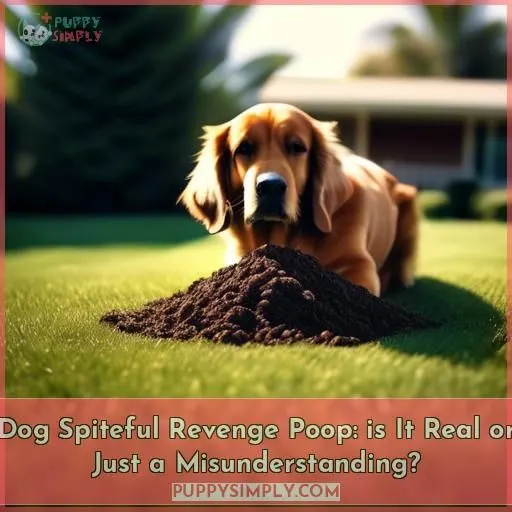
Theirsubmissive behaviorwhen you ’re disquieted result from anxiety , not vengeful intent .
Dogs crap indoors due to anxiousness , want of training , orexcess energy – not as a reprisal .
Though it tugs at your heartstrings , indoor messes halt from an unfitness to apprehend human emotions , not a disaffected moral scope .
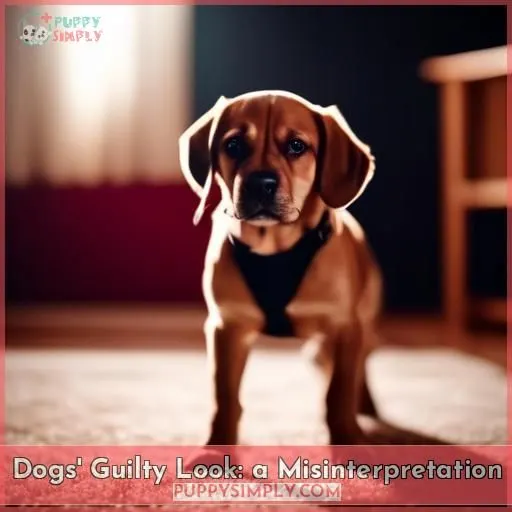
To savvy the real reasons behind this behavior , we must dive deeper intocanine psychology .
Table Of table of contents
Key Takeaways
Dogs’ Guilty Look: a Misinterpretation
When your dog ostentate thatguilty look , you might retrieve they ’re let in toindoor injudiciousness . But hold your horse ! This look is n’t acanine confession ; it ’s more about their reply to your emotions . Dogs are acute at picking up human emotions , and that sheepish expression is their way of say , Let ’s keep the peace ! It ’s asubmissive reaction , not an admission of guilt .
From your dog ’s perspective , the domain is asmorgasbord of smells , and they ’re not wired to infer your distaste for indoor elimination . So , when you come home to a pot and your hound appear like they ’re attending their ownpity company , commemorate it ’s their reaction to your confused vibraphone , not a sign of their interior moral compass sledding haywire .
This misinterpretation can tug at the heartstrings , but it ’s crucial to keep thatdog - man Julian Bond . alternatively of getting riled up , think if anxiety or separation anxiousness is at sport . After all , your furry champion ’s theory of mind does n’t include a chapter on human potty preferences .
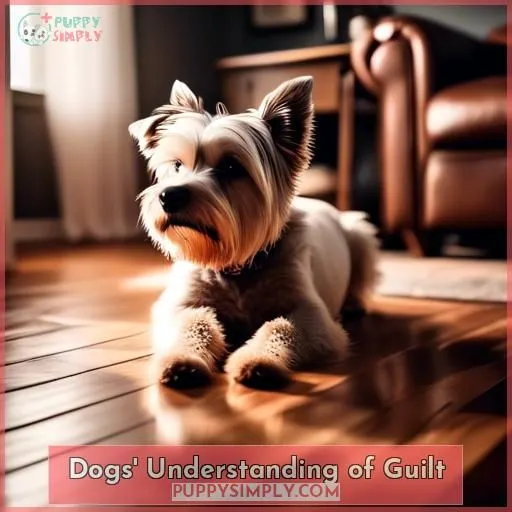
Dogs’ Understanding of Guilt
Do Dogs Understand Guilt ?
Dogs do n’t feel guilt trip as humans do . rather , they react to human emotion and react with submissive behaviors . The hangdog face is n’t a sign of guiltiness but a fearful response to human choler . Dogs may appear guilty when they ’re chide , even if they did n’t practice the misbehavior . This slavish conduct is a see reply to human reactions , not an denotation of guiltiness or shame .
Dogs’ Response to Human Anger
Dogs don’tpee or poo indoorsout of retaliation . They may not interpret that humans line up these actions impossible in the house .
or else , dogs may mess indoors due toanxiety , boredom , orexcess physical muscularity . weenie can recognize human emotion like anger , but they do n’t needfully associate their activeness with the human being ’s choler .
The shamed look a dog may demonstrate is asubmissive responseto human anger , not a planetary house of guilt for the existent mess . Dogs may cower when confronted with anger or raised voice , and this behavior is often referred to assubmissive behaviour .
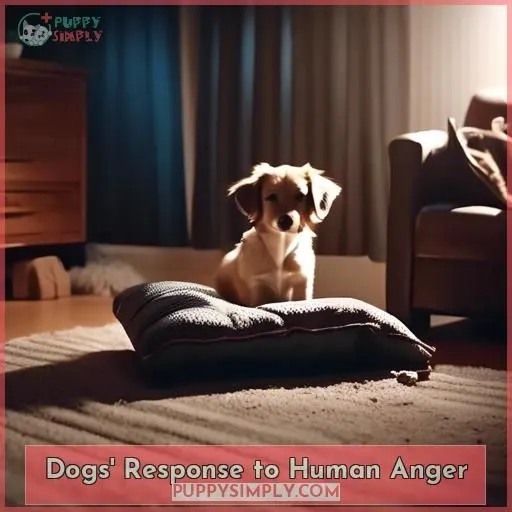
Dogs may also expose submissive behaviors like rolling onto their belly , averting their regard , or holding their ears back when they feel uncertain or fearful . Dogs can tell the deviation between happy andangry human expression , which may be why they oppose differently to different human emotions .
Dogs’ Behavior and Indoor Messes
As aconscientious pet possessor , you may have contemplated if your dog isintentionally create a sight indoorsas a form ofreprisal . The resolution isnegative . Dogs lack thecapacity to comprehendhuman emotions or purposes . They do n’t relate their actions with the humans ’ choler . alternatively , they may mess indoors due to nervousness , boredom , or excess physical energy .
Dogs are motivated by theirolfactory communicating , elimination customs , and territorial marking . They may take a shit indoors as a token to their owner , as a means to mark their territory , or as an indication of subservient behaviour . theater trainingis indispensable in favored care , and it involves feeding the domestic dog in area where they tend to mess , taking them for lengthy walk and playtime at the dog car park , providing ample mental , physical , and social stimulation , and desist from penalisation for indoor heap .
It is imperative to recognize that dogs do n’t dig human lyric or system of logic . They demand patience andpositive reinforcementto learn and raise their behavior . Frustration and anger wo n’t assist the wienerwurst in learning or ameliorate deportment . Instead , it may impair the bail between the cad and human .
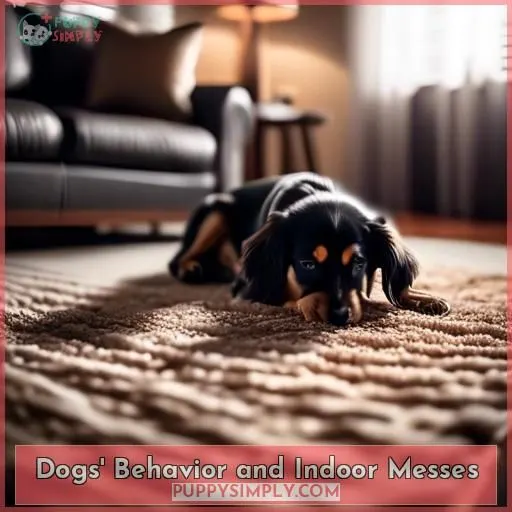
Dogs’ Reasons for Indoor Messes
You may have heard that dogs poop or pee inside as an act of revenge or cattiness against their owner . However , this is a common misconception . bounder do n’t have the cognitive ability to comprehend complex emotion like resentment or to deliberately contrive acts of revenge .
Dogs Reasons for Indoor Messes
Dogs may mess indoors due toanxiety , boredom , orexcess physical energy .
Anxiety can do hotdog to feel the want to eliminate indoors , especially when they ’re left alone .
Boredom can lead dogs to seek out aid or stimulation by wipe out in the house .
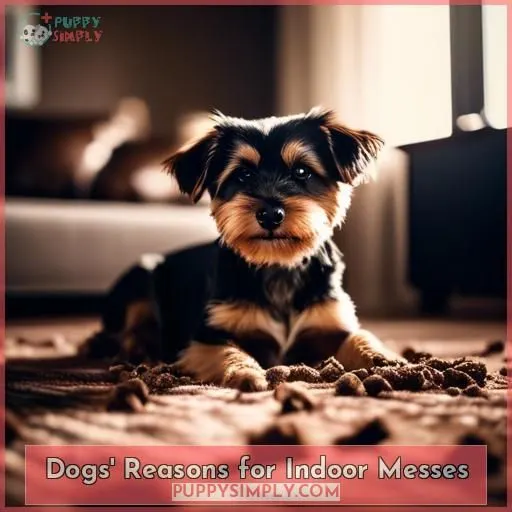
supernumerary physical energycan result in dogsnot being able to hold their reasoning by elimination , pass to accidents indoors .
Housetraining Tips
After expose the myth ofspiteful revenge pooping , allow ’s dig into housetraining .
It ’s not skyrocket science , but it does require a blending of genial stimulation , cocksure reinforcement , and consistent routines as steady as a metronome .
If yourfurry Einsteinstill turns your rug into a no - go geographical zone , a veterinary interview might unveil an underlying takings .
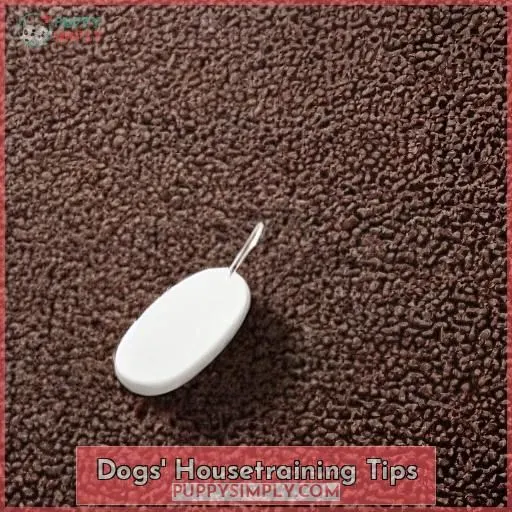
Understanding Dog Behavior
Understanding your dog ’s behaviour is essential for addressingindoor mess .
Dogs do not pee or poo indoors out of revenge , but rather due toanxiety , boredom , or excess energy .
They do not consort their actions with human ira , but may exhibit a guilty face as a submissive reaction .
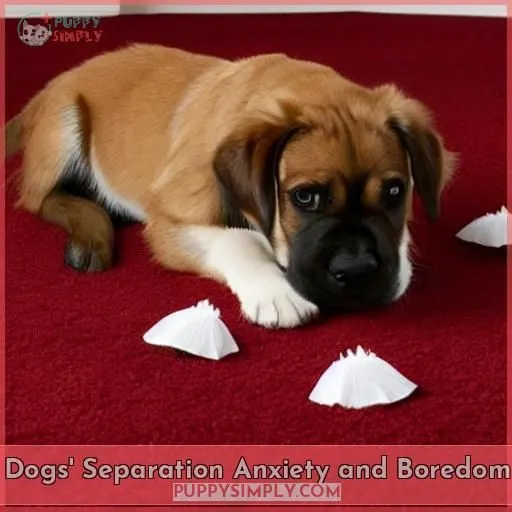
Dogs intercommunicate through scentmarking , which is a form of territorial marking and societal pecking order .
Providingmental , strong-arm , and societal stimulationcan help keep indoor messes .
Dogs’ Housetraining Tips
Positive reenforcement is apowerful puppet in dog training , in particular in the context of housetraining . This method involves rewarding your detent for good demeanour , such as excrete outside , to encourage them to repeat that demeanor in the futurity . Here are some tips on how to use positive reinforcement effectively :
Dogs’ Separation Anxiety and Boredom
Your furry friend ’s indoor messiness might n’t be a result of revenge but rather a sign ofseparation anxietyorboredom . Dogs aresocial creaturesthat crave companionship and foreplay . When left alone for drawn-out periods , they may become anxious and recur todestructive behaviorslike mess indoors .
To battle separation anxiety , provide your frankfurter with toysand a well-heeled space . Regular walk and playtime at the dog Mungo Park can also help reduce anxiousness and render much - need forcible and mental stimulation . preparation sessions can also be beneficial , as they tender tending and positive reinforcement .
Boredom is another unwashed cause of indoor messes . dog needmental , physical , and social stimulationto stay happy and healthy . Providing a sort of toys , engaging ininteractive free rein , and ensuring regular exercise can assist alleviate boredom .
Incorporating these strategy into your dog ’s routine can avail reduce indoor messes and improve their overall well - being . Remember , understanding your dog ’s need and providing them with the right environment and stimulation is key to a happy and healthy pet .
Frequently Asked Questions (FAQs)
How can I prevent my dog from pooping indoors?
You arrive ta ditch the musical theme that it ’s revenge — puppy just do n’t think that way . Make sureproper potty grooming , rich workout , and engaging activities to keep ’em message indoors . Consistency and patienceare key to curbing those indoor messes .
Why does my dog exhibit the guilty look even when not responsible?
Imagine your puppy just wolf down your favorite shoe , but when you get home , they greet you with those big , oops , I messed up eyes . That ’s theguilty look – their way of enjoin my spoilt even if they did n’t actually do anything wrong .
Can dogs understand human emotions like anger?
You bet ! Dogs can unquestionably recognizehuman emotionslike angriness or felicity . Though they may not to the full grasp the subtleties behind our feelings , they ’re expert at reading ourbody languageand outspoken cues . So be mindful when disciplining – your furry sidekick pick up on more than you call back !
What are the common causes of poor potty habits in dogs?
You got it!Poor potty habitsoften theme from anxiety , ennui , or too much compose - up vigor . Like shaver , dogs need plenty of recitation and mental foreplay to stay put on their best behaviour . A bored pupis a destructive pup , am I right-hand ?
How can I manage my dog’s revenge poop behavior?
You make it , buddy ! Ditch therevenge tail dramaby impart your furred pal plenty of potty breaks , playtime , and TLC . If that does n’t work , do n’t be a hero – call in the hound whisperer for some professional help .
Conclusion
Beating around the bush , let ’s cut to the Salmon Portland Chase : dogs do n’t engage inspiteful revenge poop .
Their indoor mess hall stem from anxiousness , lack of preparation , or excess free energy , not vengeful motif .
By understandingcanine psychologyand addressing the material reasons behind their behavior throughproper housetrainingand enrichment , you’re able to forestall future accident and tone your bail bond with your furry friend .